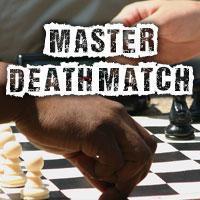
Ashes! Ashes! The Flag is Falling Down at Death Match 19
In 1882, Australian cricketers came to London and won a test match in England for the first time ever. "The Ashes" of English cricket tradition were transported back with the victors to the Southern Hemisphere.
The two countries continue to meet on the pitch to win the trophy, which went from nothing, to an urn, to a Waterford Crystal. When English GM Simon Williams meets Australian GM David Smerdon in Death Match 19 on November 2 at noon Eastern, a fancy award won't be at stake, but $1000 will be.
"Anyone who follows 'The Ashes' will understand that there is always some pride and banter involved when England faces the Aussies," Williams said. "All good-hearted of course?"

After Oliver Cromwell, the most famous redheaded Briton? (courtesy Williams)
Smerdon said he plays cricket himself, though there will be no fours and sixes, just single wins and losses in the approximately 30 games. Also, the "Death Test Match" will take place over three hours, not five days, but the rules of the chess version are more strict - the players can't break for tea!
Smerdon won't be playing on English soil as his forebearers did - he is staying put in the Netherlands after completing his master's degree in Human Behavior and Economics (he is continuing in Amsterdam for his doctorate). "I'm a summer child at heart, and the horizontal rain of Holland definitely makes me long for Aussie beaches," he said. Why endure the sticky wicket of Northern Europe's inferior weather? "I met a girl..."

Smerdon going to Sweden to find some fair weather (courtesy Smerdon)
It is doubtful that too many cricket players have ever shared the two colorful nicknames of these Death Match participants.
Smerdon goes by "Smurf" thanks to his adolescent clothing. "There was a time as a junior when I was young and cute. No, really! And I often wore a blue hoodie," he explained. "Given my surname, which is pronounced 'Smur-don', it wasn't long before the nickname came about. I think IA Charles Zworestine was the first one to write it in an article."
Nor did Williams employ a high-powered marketing firm for his moniker. "The name 'Ginger GM' came from a serious business chat down at the local pub. Myself and IM Simon Ansell were throwing about some ideas about designing a web site... After numerous glasses of wine he proposed 'GingerGM.com.' Seemed like a good idea at the time."
But is he the best cardinal on the tournament circuit? "I have serious competition in the redhead department, with the likes of Potkin and Khalifman lurking in the background. Another 'serious' chat once led us to attempting to put together a chess team in the English League, just comprising of redheads."

Former World Champion Khalifman. World's strongest-ever redhead? (Courtesy whychess.com)
The Death Match, which is played in three continuous sections, requires the players to play about one hour of 5-minute blitz, one hour of 3-minute blitz, and a final hour of bullet, all with 1-second increment.
Both play a fair bit on the Internet, but on ICC Williams ditches his firey hair and plays under "Psycho-Cowboy."
"I used to like 3-minute but now my preference is 5-minute," he said. "I must admit that I am rather concerned about the 1-minute games."
Smerdon queues a game to break up long study sessions in graduate school. He usually chooses 3-minute. "The problem with playing a game or two after a few hours of academic study is that I am essentially trying to relax and so the tactics aren't as sharp... I used to play 1 0 when I was a kid, but these days my reflexes with a mouse aren't as crash hot."

Smerdon (r) and a mate having some fun at an Indian wedding (courtesy Smerdon)
Williams will be days shy of turning 34, while Smerdon has just turned 29.
Unlike in much of sport, there's not much bravado or vainglorious speech in the buildup to the match. Smerdon called his style of play "unorthodox," adding, "I probably have the worst opening repetoire of any grandmaster by classical standards." How does he compete? "I try to make up for it with creativity and shock-and-awe tactics."
In his first time representing Australia at the Olympiad, Smerdon said he was "quite nervous" but still found some of that creativity with moves like 33...Rg3!
Unlike Smerdon, Williams is a big theoretician in certain openings. He has released several books and DVDs on the Dutch Defense, becoming one of the world's foremost practitioners of the opening, even beating the resurgent GM Boris Gelfand last year with it. Here, he makes quick work of another Super-GM, and gets home early for dinner.
How much can we expect his favorite opening to appear in the Death Match? "As far as I know, David is an e4-player, so that may be a bit tricky," Williams said. "Give me a chance though, and I will attempt to throw the f-pawn down the board." There's always the Latvian or Schilemann Gambits!
Meanwhile, don't expect Smerdon to push his f-pawn as Black. In his most recent Chess.com blog post, he breaks up with his lifelong love, the Stonewall. You can also read more about his favorite movies and chess experiences in an interview from earlier this month.
When Williams plays White, watch out for the g-pawn too. He grew up close to IM Michael Basman, who enjoyed playing the Grob (Basman also sometimes played 1...g5 as Black, even beating GM Jonathan Speelman with it).

Basman, trying to get Carlsen to open 1. h3 (courtesy Ray Morris-Hill, London Chess Classic)
Williams also idolized Speelman and the late GM Tony Miles, who "played in a typical eccentric British manner." (For Smerdon, in his youth he had many fewer proximate GMs to pick from, and so admired GM Ian Rogers.)
In a recent respite in between games at the Reykjavik Open, Williams got a chance to learn more about the most eccentric player of them all. He came across a "bizarre" book shop. "This was the kind of place that books desired to live in. Books everywhere, small alcoves and places to sit and hide." The owner told Williams that Bobby Fischer frequented the shop most days, falling asleep in a "chair" of old chess books. "You could imagine Fischer being there, spending his last days in some state of peace."
Smerdon said that his economics study has helped his chess, and vice-versa. "In particular, chess training has helped me become better at exams, at solving abstract problems and at planning and strategizing in my research." What about investing? "There are a lot of examples of chess players being very successful in the financial world, such as GMs Luke McShane and David Norwood. Then again, I know lots of examples of chess players who are horrible at making decisions in the real world."
So while Williams tries to play Gargamel to the Smurf, and Smerdon in turn tries to make Ginger snaps, both are happy they're not playing certain grandmasters. They differed on who is the world's best blitz player.

Will Smerdon become Papa Smurf at match end?
"I have previously played Magnus, Nakamura, Grischuk, Tkachiev and Nepomniachtchi all for money in blitz," Williams said. "This is normally in a bar, late at night, so it is rather hard to judge, but Magnus impressed me the most. I managed to win some money off the Russian contingents, but they were giving me five minutes against their two."
"In my possibly controversial opinion, the best blitz player is French GM Maxime Vachier-Legrave," Smerdon said. "I guess he would have to give me time odds of something like four minutes to two to make it fair."
Tune in to Chess.com/tv on November 2 at noon Eastern (U.S.), 9 a.m. Pacific, for all the games, live commentary, and interviews with the players. Hosts GM Ben Finegold and FM Mike Klein will bring you all the action of Death Match 19. Free to all Chess.com members!







